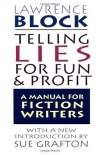Manual For Fiction Writers by Block, Lawrence (classic books to read .TXT) 📗

Book online «Manual For Fiction Writers by Block, Lawrence (classic books to read .TXT) 📗». Author Block, Lawrence
Monday morning he called in sick and rolled a sheet of paper into his typewriter. By the time his wife got home from her job he had eight or ten pages of a novel written. He called in sick Tuesday and did another chunk of the book. Same thing Wednesday.
Thursday he got up bright and early, ate as hearty a breakfast as the next condemned man, and went to his office. A couple of hours later my phone rang. I just quit my job, he said. The book's coming along nicely and I want to stay with it.
I don't remember what I said. Probably something along the lines of yeah-but-how-are-you-gonna-make-a-living?
No problem, he said. I'm a writer now.
I wasn't convinced of the truth of either of those sentences, but even so I figured his downside risk was limited. After all, his wife was working, they didn't have any kids, their basic overhead was low and the job he'd quit hadn't been such a much. After a little token breastbeating at having encouraged him to persist in his folly, I gave a shrug that would have gladdened a Frenchman's heart and went on about my business, such as it was.
Couple of weeks later he presented me with something like two hundred fifty pages of manuscript. Would I be so kind? Ahem. I took it home. I sat down with it. I started to read.
Page for page and line for line, his book was as bad a piece of writing as I've ever been confronted with, and that covers a lot of ground. It was not publishable, but that's the least of it. It was not rewritable, either, nor was it readable. Nor, alas, could it have been described as promising. There was nothing promising about it. No one could in good conscience read that manuscript and encourage its author to try writing anything more ambitious than a laundry list.
I was aghast. My friend had quit a job to produce this? Well, he'd better get another in a hurry. Assuming he could find someone fool enough to hire him.
I didn't have the guts to say any of this. Instead I passed the buck?and the manuscript with it?to my agent. When his judgment echoed mine we tried to figure out what to tell the author. We decided to stall, and while we did so my friend told me he was halfway through Novel Number Two.
The second book was much better. It was still nothing you'd be tempted to call good, but it was written in a language readily identifiable as English. My friend finished it, gave it to me and then to my agent, and went on to the third book.
The second book didn't sell. The third did, though, and the fourth and fifth. They were not wildly successful. They were published as hardcover mysteries, had reasonably positive reviews and mediocre sales, and did not go into paperback. One got nominated for an award but failed to win.
The story could stop right there and it wouldn't be the worst story ever told, either. But there's more. My friend went on to write several more mysteries, and these did not sell. There was a market slump about that time, and hardcover mysteries were suddenly about as much in demand as legionnaire's disease. My friend wrote three or four in a row and couldn't get arrested.
By this time he was single again, and broke. He took a job tending bar and wrote days. After a while he quit writing mysteries that nobody wanted and began doing the preliminary research for a large-scale adventure novel that would capitalize on his interests and areas of expertise. He spent a lot of time on research and more on plot development, and then he went on to spend a great deal more time writing and rewriting. Then the book came out, had a six-figure paperback sale and a six-figure movie sale, touched one or two of the bestseller lists briefly, and must have earned him something like?what? Half a million? I don't know, and it's not really important, because this chapter isn't about money. It's about writing, and the set of mind necessary to make a go of it.
At first glance, the story's point seems obvious enough. My friend had the will to succeed, the drive to keep going in the face of discouragement and rejection. He had, too, a perception of himself as a writer that refused to fade. In addition, he had a single-mindedness of purpose that enabled him to take chances. Quitting his job on the basis of a few days' production was probably ill-advised, and I certainly would not recommend it to anyone in a similar situation, but perhaps it was essential for him. Suppose he'd worked nights and weekends on that first book, taking a year or so to produce an unsalable manuscript. Would he have been as quick to plunge in again and write books two and three?
When, after having sold several books, he found himself incapable of supporting himself by writing, he might have tried to find a job rather like the one he had left. Instead he deliberately sought out a subsistence job, undemanding parttime work that let him pay the





Comments (0)